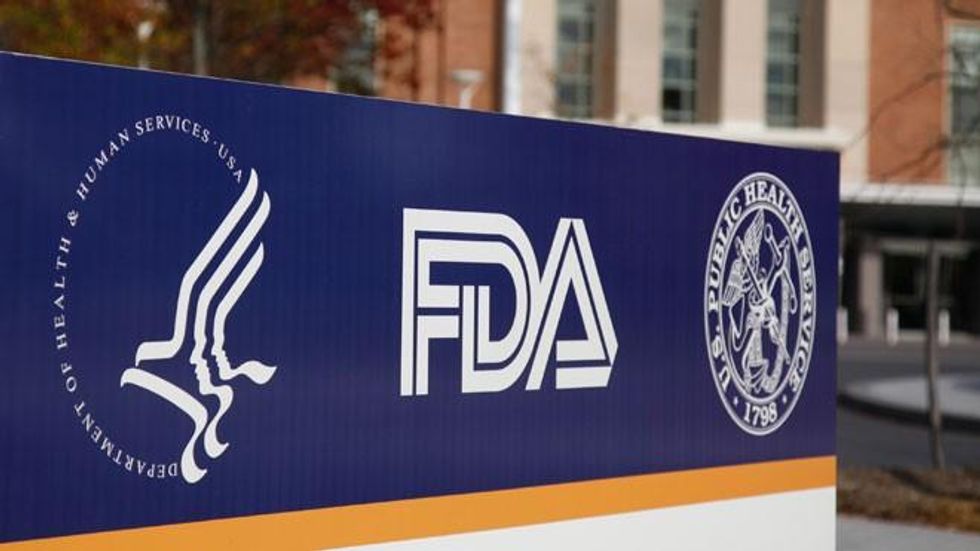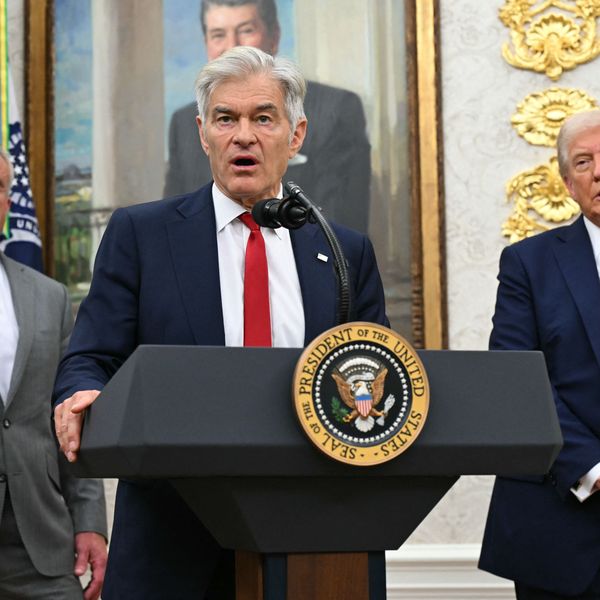FDA Policy: Big Pharma Firms Pay to Play
'Instead of protecting the public health, the FDA has been allowing the drug companies to pay for a seat at a small table where all the rules were written.'

The Washington Post reports:
A scientific panel that shaped the federal government's policy for testing the safety and effectiveness of painkillers was funded by major pharmaceutical companies that paid hundreds of thousands of dollars for the chance to affect the thinking of the Food and Drug Administration, according to hundreds of e-mails obtained by a public records request.
The e-mails show that the companies paid as much as $25,000 to attend any given meeting of the panel, which had been set up by two academics to provide advice to the FDA on how to weigh the evidence from clinical trials. A leading FDA official later called the group "an essential collaborative effort."
"They are getting a huge amount for very little money (impact on FDA thinking, exposure to FDA thinking, exposure to academic opinion leaders and their expertise, journal article authorship, etc.) and they know it," explains researcher behind the scheme.
The emails show exchanges between two medical professors at the head of a yearly clinical trials review panel known as IMMPACT. In the exchange, professors Robert Dworkin of the University of Rochester and Dennis Turk of the University of Washington discuss funding for the event and their inclusion of 14 pharmaceuticals companies who paid up to $25,000 each for admittance this year alone.
In these IMPAACT meetings, a panel of scientists, representatives from the FDA, the National Institute of Health (NIH) and the participating major pharmaceutical companies discuss the safety of individual painkillers and the procedures and results of clinical trials.
Together, the group produces and publishes scientific guidelines and "consensus" statements on the testing of the drugs, which Bob Rappaport, the chief of the FDA's analgesic division and an attendee of many meetings of the group, has called "a wealth of opportunity for communication" that is "approving new analgesic drug products."
In regards to the "fee" taken from pharmaceutical companies to partake, Prof. Dworkin explicitly explained the rationale in an email to partner Prof. Turk:
20k is small change, and they can justify it easily if they want to be at the table. Everybody has been very happy with [the meetings] and they are getting a huge amount for very little money (impact on FDA thinking, exposure to FDA thinking, exposure to academic opinion leaders and their expertise, journal article authorship, etc.) and they know it.
"These e-mails help explain the disastrous decisions the FDA's analgesic division has made over the last 10 years," Craig Mayton, the Columbus, Ohio attorney who made the public records request to the University of Washington, told The Washington Post. "Instead of protecting the public health, the FDA has been allowing the drug companies to pay for a seat at a small table where all the rules were written."
The emails reveal a "pay-for-play arrangement" where companies buy access to policy-shaping, said Michael Carome, director of health research for the watchdog group Public Citizen.
"The whole picture is a troubling one and it warrants an independent investigation," said Carome.
_______________________
An Urgent Message From Our Co-Founder
Dear Common Dreams reader, The U.S. is on a fast track to authoritarianism like nothing I've ever seen. Meanwhile, corporate news outlets are utterly capitulating to Trump, twisting their coverage to avoid drawing his ire while lining up to stuff cash in his pockets. That's why I believe that Common Dreams is doing the best and most consequential reporting that we've ever done. Our small but mighty team is a progressive reporting powerhouse, covering the news every day that the corporate media never will. Our mission has always been simple: To inform. To inspire. And to ignite change for the common good. Now here's the key piece that I want all our readers to understand: None of this would be possible without your financial support. That's not just some fundraising cliche. It's the absolute and literal truth. We don't accept corporate advertising and never will. We don't have a paywall because we don't think people should be blocked from critical news based on their ability to pay. Everything we do is funded by the donations of readers like you. Will you donate now to help power the nonprofit, independent reporting of Common Dreams? Thank you for being a vital member of our community. Together, we can keep independent journalism alive when it’s needed most. - Craig Brown, Co-founder |
Jacob Chamberlain is a former staff writer for Common Dreams. He is the author of Migrant Justice in the Age of Removal. His website is www.jacobpchamberlain.com.

The Washington Post reports:
A scientific panel that shaped the federal government's policy for testing the safety and effectiveness of painkillers was funded by major pharmaceutical companies that paid hundreds of thousands of dollars for the chance to affect the thinking of the Food and Drug Administration, according to hundreds of e-mails obtained by a public records request.
The e-mails show that the companies paid as much as $25,000 to attend any given meeting of the panel, which had been set up by two academics to provide advice to the FDA on how to weigh the evidence from clinical trials. A leading FDA official later called the group "an essential collaborative effort."
"They are getting a huge amount for very little money (impact on FDA thinking, exposure to FDA thinking, exposure to academic opinion leaders and their expertise, journal article authorship, etc.) and they know it," explains researcher behind the scheme.
The emails show exchanges between two medical professors at the head of a yearly clinical trials review panel known as IMMPACT. In the exchange, professors Robert Dworkin of the University of Rochester and Dennis Turk of the University of Washington discuss funding for the event and their inclusion of 14 pharmaceuticals companies who paid up to $25,000 each for admittance this year alone.
In these IMPAACT meetings, a panel of scientists, representatives from the FDA, the National Institute of Health (NIH) and the participating major pharmaceutical companies discuss the safety of individual painkillers and the procedures and results of clinical trials.
Together, the group produces and publishes scientific guidelines and "consensus" statements on the testing of the drugs, which Bob Rappaport, the chief of the FDA's analgesic division and an attendee of many meetings of the group, has called "a wealth of opportunity for communication" that is "approving new analgesic drug products."
In regards to the "fee" taken from pharmaceutical companies to partake, Prof. Dworkin explicitly explained the rationale in an email to partner Prof. Turk:
20k is small change, and they can justify it easily if they want to be at the table. Everybody has been very happy with [the meetings] and they are getting a huge amount for very little money (impact on FDA thinking, exposure to FDA thinking, exposure to academic opinion leaders and their expertise, journal article authorship, etc.) and they know it.
"These e-mails help explain the disastrous decisions the FDA's analgesic division has made over the last 10 years," Craig Mayton, the Columbus, Ohio attorney who made the public records request to the University of Washington, told The Washington Post. "Instead of protecting the public health, the FDA has been allowing the drug companies to pay for a seat at a small table where all the rules were written."
The emails reveal a "pay-for-play arrangement" where companies buy access to policy-shaping, said Michael Carome, director of health research for the watchdog group Public Citizen.
"The whole picture is a troubling one and it warrants an independent investigation," said Carome.
_______________________
Jacob Chamberlain is a former staff writer for Common Dreams. He is the author of Migrant Justice in the Age of Removal. His website is www.jacobpchamberlain.com.

The Washington Post reports:
A scientific panel that shaped the federal government's policy for testing the safety and effectiveness of painkillers was funded by major pharmaceutical companies that paid hundreds of thousands of dollars for the chance to affect the thinking of the Food and Drug Administration, according to hundreds of e-mails obtained by a public records request.
The e-mails show that the companies paid as much as $25,000 to attend any given meeting of the panel, which had been set up by two academics to provide advice to the FDA on how to weigh the evidence from clinical trials. A leading FDA official later called the group "an essential collaborative effort."
"They are getting a huge amount for very little money (impact on FDA thinking, exposure to FDA thinking, exposure to academic opinion leaders and their expertise, journal article authorship, etc.) and they know it," explains researcher behind the scheme.
The emails show exchanges between two medical professors at the head of a yearly clinical trials review panel known as IMMPACT. In the exchange, professors Robert Dworkin of the University of Rochester and Dennis Turk of the University of Washington discuss funding for the event and their inclusion of 14 pharmaceuticals companies who paid up to $25,000 each for admittance this year alone.
In these IMPAACT meetings, a panel of scientists, representatives from the FDA, the National Institute of Health (NIH) and the participating major pharmaceutical companies discuss the safety of individual painkillers and the procedures and results of clinical trials.
Together, the group produces and publishes scientific guidelines and "consensus" statements on the testing of the drugs, which Bob Rappaport, the chief of the FDA's analgesic division and an attendee of many meetings of the group, has called "a wealth of opportunity for communication" that is "approving new analgesic drug products."
In regards to the "fee" taken from pharmaceutical companies to partake, Prof. Dworkin explicitly explained the rationale in an email to partner Prof. Turk:
20k is small change, and they can justify it easily if they want to be at the table. Everybody has been very happy with [the meetings] and they are getting a huge amount for very little money (impact on FDA thinking, exposure to FDA thinking, exposure to academic opinion leaders and their expertise, journal article authorship, etc.) and they know it.
"These e-mails help explain the disastrous decisions the FDA's analgesic division has made over the last 10 years," Craig Mayton, the Columbus, Ohio attorney who made the public records request to the University of Washington, told The Washington Post. "Instead of protecting the public health, the FDA has been allowing the drug companies to pay for a seat at a small table where all the rules were written."
The emails reveal a "pay-for-play arrangement" where companies buy access to policy-shaping, said Michael Carome, director of health research for the watchdog group Public Citizen.
"The whole picture is a troubling one and it warrants an independent investigation," said Carome.
_______________________

